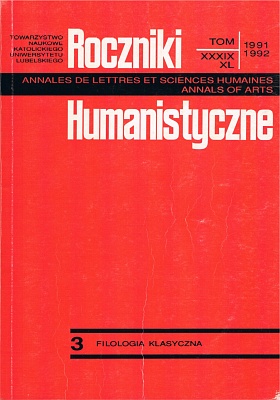Tragedia Ajschylosa jako widowisko teatralne
Abstrakt
In the initial section of the article the author justifies the view that it is bout useful and necessary to apply the theatrical theory of drama to the study of ancient Greek tragedy. Analyzing Aristotle’s Poetics he first shows that while the Philosopher says several times that tragedy can achieve its effect even without stage production (ὄψις), in his many observations on tragedy he envisages it as a theatrical performance and in fact takes the performance aspect of drama as its organic part.
As the author argues next, tragedy originated as a performance; this concerns the genre as a whole as well as individual plays. As a genre it enriched poetry by contributing visual and accustic aspects, a fact also recognized by Aristotle. The Greek playwright made his plays for the stage and the spectator, not for the reader. Since in Aeschylus’ days the dramatic poet was also a director and an actor, every word in his plays was both literature and theatre.
In the second section of the article the author uses examples selected from Aeschylus’ extant plays to demonstrate how closely interwoven the poet’s word and stage image are and how they work together in the creation of the represented world. The word does not lose its poetic force in the process; it is not merely a score as has sometimes been said, but − supported by visual images − it is the more effective in stirring the viewer’s imagination.
Copyright (c) 1992 Roczniki Humanistyczne

Utwór dostępny jest na licencji Creative Commons Uznanie autorstwa – Użycie niekomercyjne – Bez utworów zależnych 4.0 Międzynarodowe.





